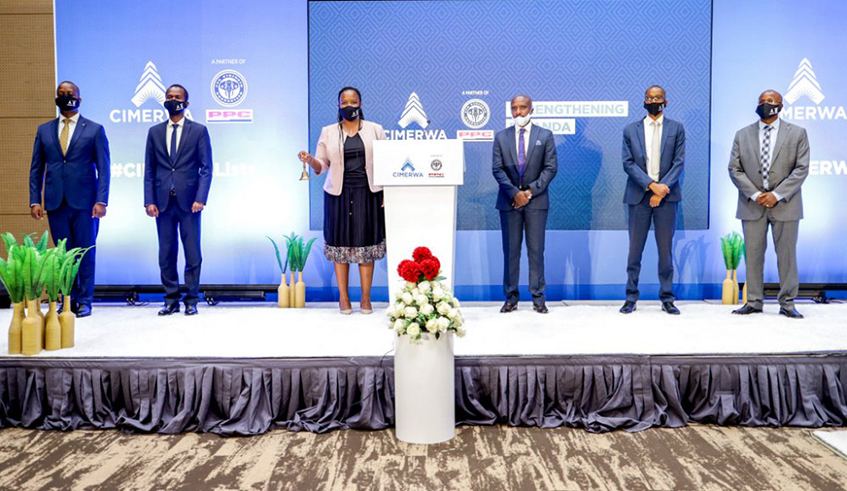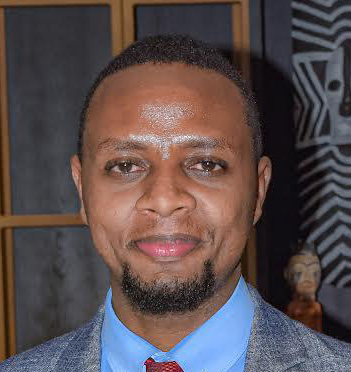

Rwanda’s largest cement manufacturer, Cimerwa, on Monday listed all its shares on the Rwanda Stock Exchange (RSE), becoming the 10th company to trade on the local bourse.
The South African and Rwandan owned company floated 49 per cent of its shares on the local exchange, opening up opportunities for investors to own stocks in the firm.
"This sets a sound basis for the sector’s future potential,” Cimerwa’s Chief Executive Officer, Albert Sigei, said.
Sigei described the transaction, which was facilitated by BK Capital, as the perfect platform for "us to rearm our pledge to our loyal customers and stakeholders.”
The listing of Cimerwa was seen as yet another boost to the country’s nascent stock market, which a couple years ago only had a handful of players.
That is because it comes at a time Rwanda seeks to position itself as a regional financial hub.
The entry of Cimerwa brings a total of trading companies on the RSE to 10, including Bank of Kigali (BK), Kenya Commercial Bank (KCB), National Media Group (NMG), Bralirwa, Uchumi Supermarket, Equity Bank, I&M Bank Rwanda, Crystal Telecom, and RH Bophelo.
The stock market was established back in 2009.
At the time, there was no formal exchange, rather securities were traded on what was known as the Rwanda Over-the-Counter (ROTC) – a process of trading securities for companies that are not listed on a formal exchange.
Looking back, Dr. James Ndahiro, the Technical Advisor to the Capital Market Authority (CMA) and the former Chairman of RSE, says the biggest step taken so far is around mindset change.
"Rwandans have evolved from traditional investment of brick-and-mortar to embrace securities and bonds, which is really a good sign of development,” he told The New Times on Tuesday.
The issue from the beginning was to convince companies that they are better off listed publicly, Ndahiro said.
Ndahiro further pointed out that the markets have offered an opportunity to both Rwandans and foreigners to diversify their businesses, raise cheap capital and share risk with others.
"They are even realising that it is also a good strategy for whenever you want to exit the business,” he said.
The capital market was set up in 2009 with the aim of making available a market mechanism that would enable the private and public sectors to have access to long term capital for economic development.
Early days
KCB became the first company to list on the exchange in June 2009, followed by Bralirwa in 2011 when the Rwanda Stock Exchange was formally established.
"The listing of Bralirwa at the time attracted a lot of attention because it was then a household brand, even though the concept at the time was not understood by many people,” Ndahiro recalled.
During the second year of its existence, the capital market was able to mobilise Rwf5 billion, which was raised during the third and fourth quarter of 2009/2010 through the issuance of two treasury bonds.
When the equity market was activated, KCB was cross listed on June 18, 2009 with a total of 91,600 shares, which were traded at the opening price of Rwf160 per share.
Today, KCB share price is Rwf370, reflecting a growth in share value.
The bond market was similarly tiny. Only two Government bonds were issued in 2009/2010.
"Today, all government bonds that are issued get oversubscribed. It was not the same case when the Rwanda Stock Exchange was first established,” Célestin Rwabukumba, the chief executive of RSE, noted.
Outlook
Shortly before Cimerwa listed on the RSE, another South African healthcare firm RH Bophelo Limited had cross-listed on the local exchange in May this year.
The volume and value of transactions, as well as the market capitalization has been growing.
This year, Rwanda Stock Exchange (RSE) surpassed $1 billion in trading with officials saying in January that some $761 million had been raised in the primary market, while $306 million has been traded on the secondary market.
"Raising $1 billion from an economy of $9 billion in less than 10 years is a big achievement, because it represents almost 10 per cent of the entire economy,” Rwabukumba said.
As of December last year, there were 20,000 active investors on the local stock market from 18,764 in December the previous year.
That represents 83.6 per cent of local investors, 13.8 per cent regional, and the rest were international.
The government sees the capital market as one of the key drivers for its ambitious plan of positioning Rwanda as a financial hub.
The government has also set up the Kigali International Financial Centre (KIFC).
The project is undertaking several financial reforms that could pave the way for entry of big players in investment banking, capital markets, and wealth management firms, among others.
For the capital market to play a key role in realizing that agenda, Ndahiro suggests that it will start from increasing liquidity – basically increasing stocks that have sufficient trading volume to allow traders to enter and exit positions easily.
"The biggest challenge we have here is liquidity. The markets cannot be vibrant if there is liquidity hiccups,” he noted.


